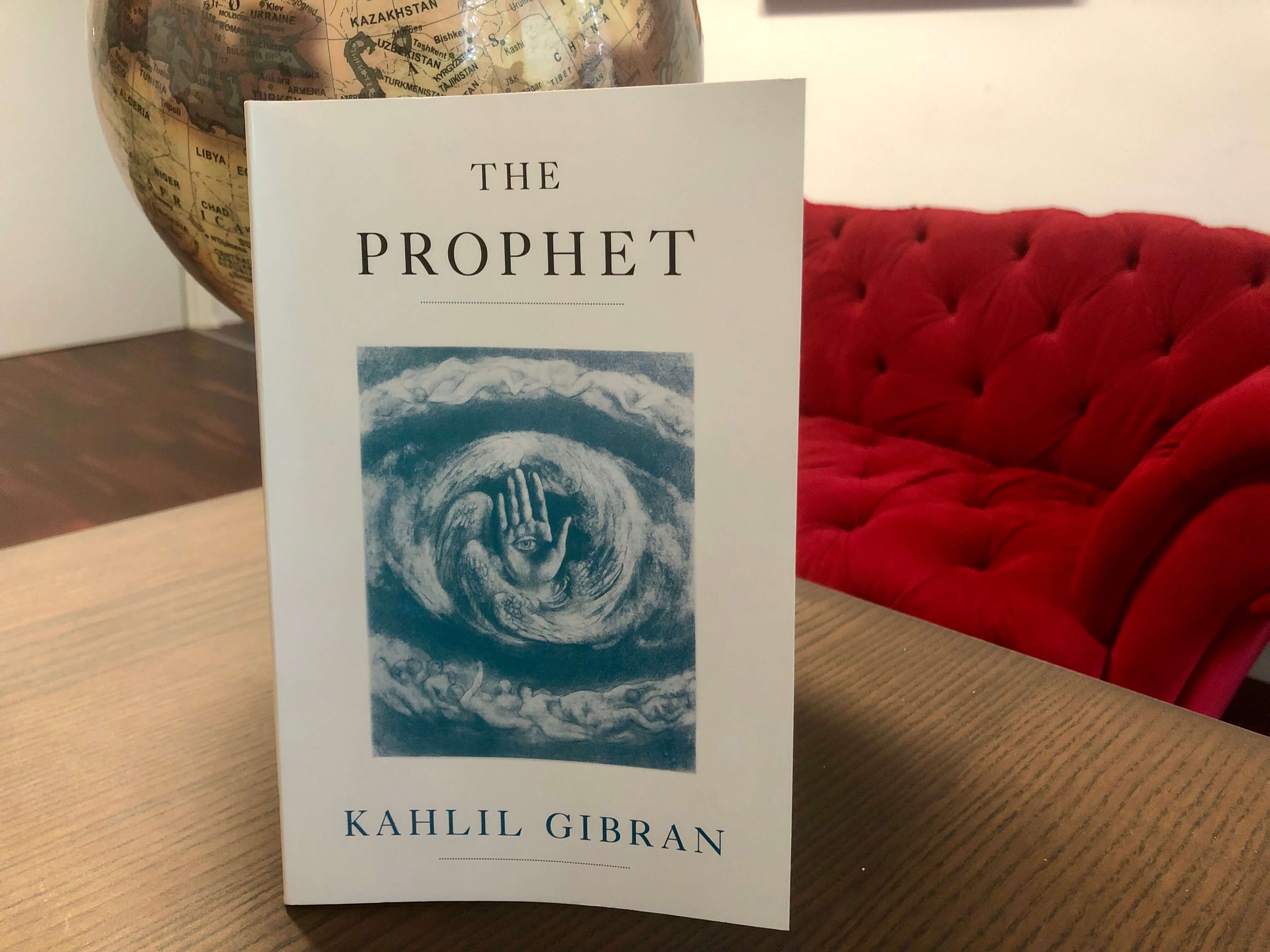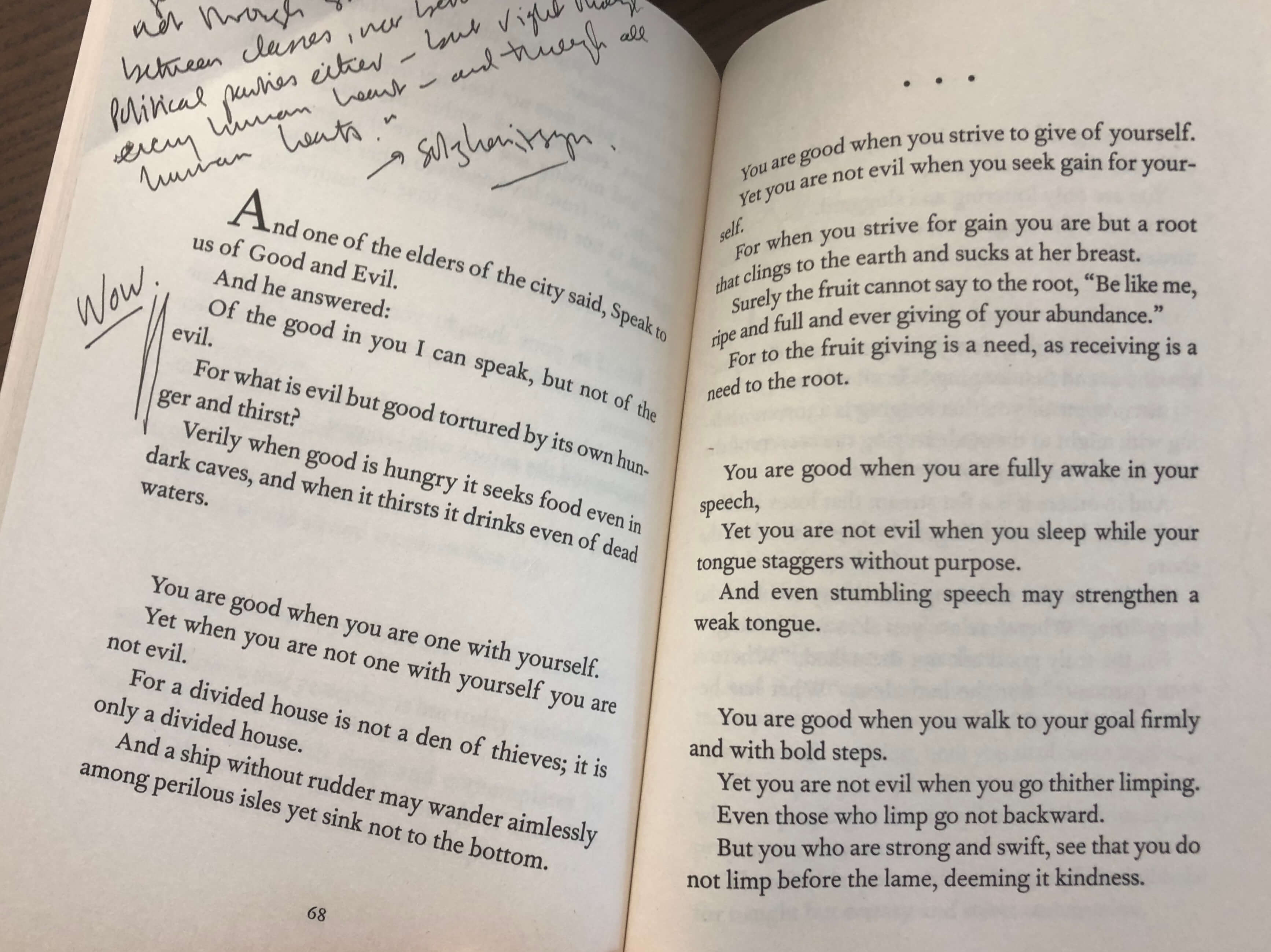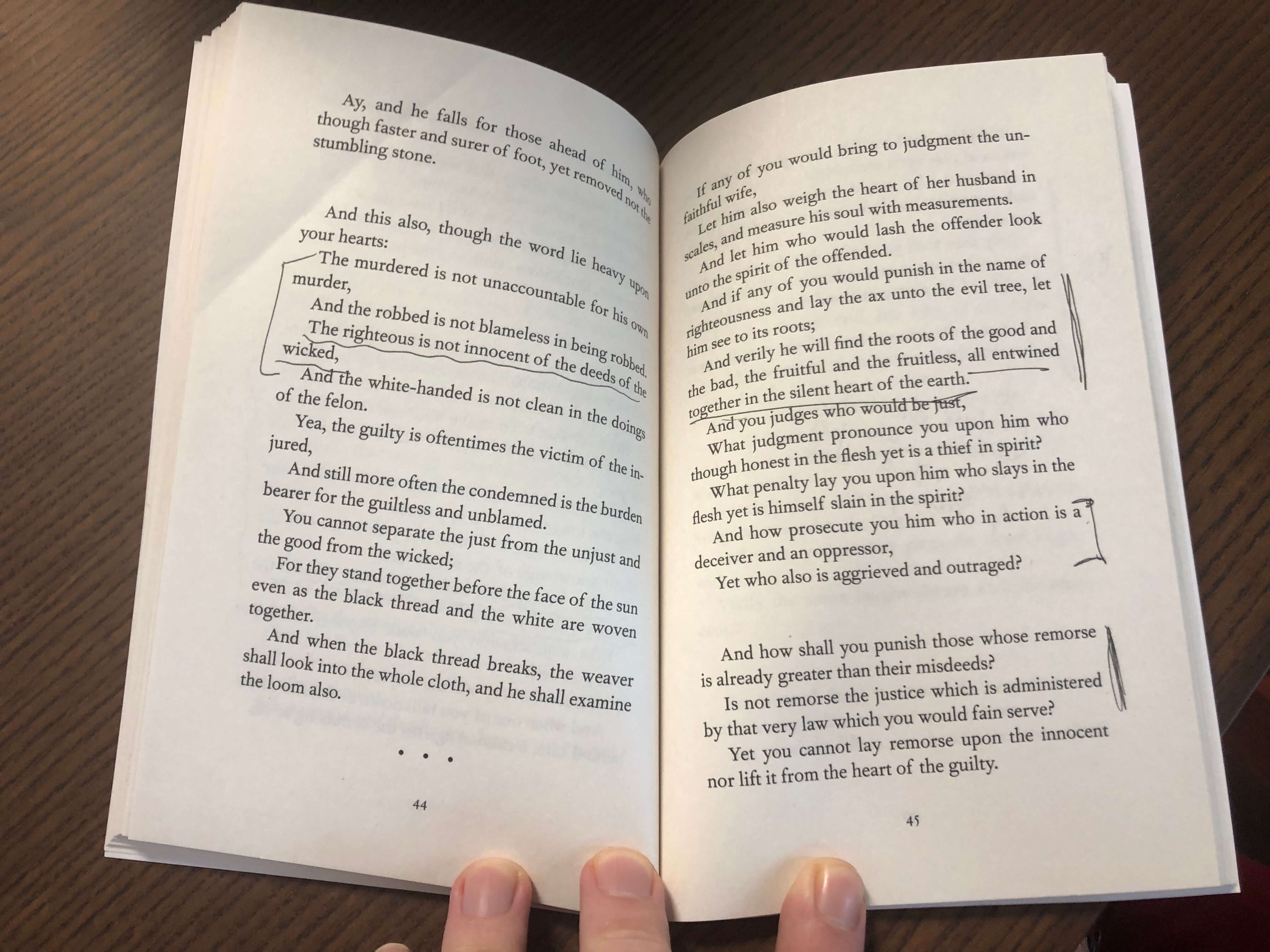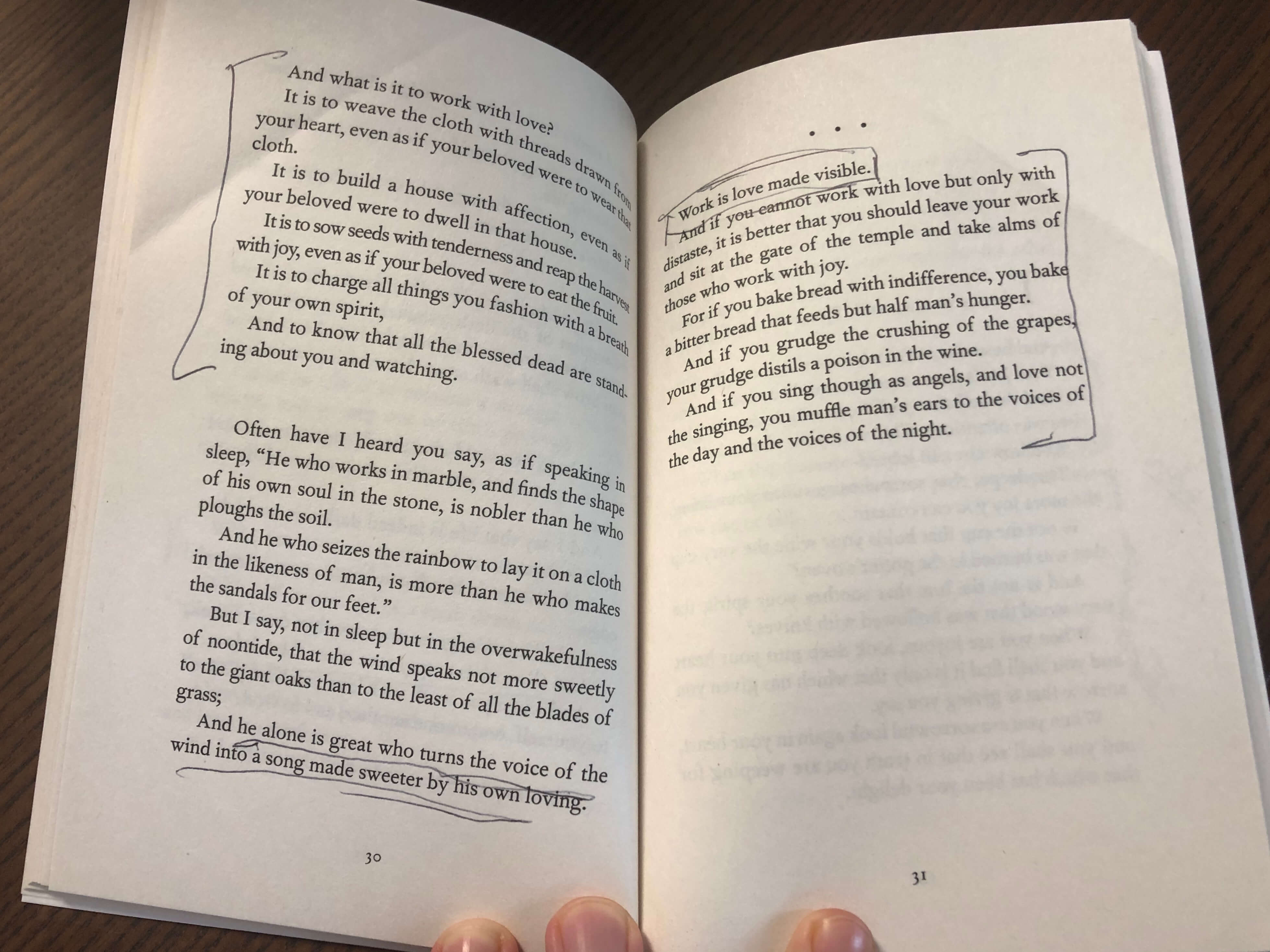The Prophet is one of the most translated books in history.
Translated into over 100 languages and never out of print. As such, the chance is high you’ve already read it.
But if you haven’t, I implore you to make The Prophet by Kahlil Gibran one of the books you read this year. It’s a short work, but the lessons will stay with you long after you’ve read it.
The Prophet is comprised of 26 beautifully poetic meditations on the nature of every big important topic concerning the human condition: work, love, crime and punishment, justice, freedom, friendship, passion, pain, self-knowledge, beauty, death, and so much more.
Like Rilke’s Letters to a Young Poet, The Prophet could be read one of two ways:
- You can read it as though each line were a gong being sounded in the temple of your heart. Deep resonant everlasting truths that encapsulate the good aims of all religions.
- You can read it cynically and see the book as a bunch of pretty sounding but meaningless platitudes.
I prefer to read works like these in the former way.
I have a good bullshit detector and, even behind the written word that is perfectly sculpted and manicured, I can see if a writer has put their life and soul into a work or if they are just trying to turn a buck by appealing to the masses.
The Prophet by Kahlil Gibran (Book Review)
A decent review of The Prophet need only contain the particular quotes that were most resonant.
Explaining around the quotes strips the original poetry of their precision and power.
So what I’ll do in this review is introduce the quotes that meant the most to me, then we’ll talk about how to practically apply them in your life.
Books like The Prophet should not just be read as tomes of feel good soundbites. You need to put these things to work!
“Of the good in you I can speak, but not of the evil. For what is evil but good tortured by its own hunger and thirst?”
I love this.
This reminds me of the part of The Gulag Archipelago where Alexander Solzhenitsyn says this:
The line separating good and evil passes not through states, nor between classes, nor between political parties either – but right through every human heart – and through all human hearts.
Both are paradigm shifts to thinking about good and evil, but Gibran’s is more optimistic.
Gibran is refusing to speak of the evil in one. He is choosing to see evil in others as simply good tortured by hunger and thirst.
What he’s saying here is that everybody has their reasons for the evils they perpetrate, and few people (I’m thinking no one but the mentally ill) would believe themselves to be evil.
In his own way (a different paradigm) Gibran, like Solzhenitsyn, sees all humans capable of the good and the bad.
You are capable of good and evil.
Whenever the discussion of what one would do if they were in Nazi Germany comes up, everyone believes they would be one of the rare few harbouring Jews.
No one believes they would simply keep their heads down in order to keep their family alive.
Even fewer believe they would actively be part of the Nazi party.
But this belief is likely erroneous – statistically and historically we know that you were more likely to be on the side of evil (even if you chose the lesser evil of not being active but at least keeping quiet about the atrocities).
Do terrorists see themselves as terrorists?
Or do they see themselves as patriots?
As martyrs?
As a method of getting along better with people in the world, rather than blindly ranting and raving next time you perceive the slightest injustice, ask yourself how another’s seemingly callous or selfish actions could simply be “good tortured by its own hunger and thirst”.
The Prophet on friendship
When you part from your friend, you grieve not; For that which you love most in him may be clearer in his absence, as the mountain to the climber is clearer from the plain. And let there be no purpose in friendship save the deepening of the spirit.
Gibran goes a little further and talks about the importance of sharing laughter and pleasure in little things with your friends and not only burdening them or seeking them out in times of need.
I’ve been talking about this perfect dichotomy of friendship for ten years now.
It’s nice to see a poet of Gibran’s calibre echo my same thoughts: conversation with friends should be funny or profound.
Your discourses should move you to tears of laughter or bring forth untold realisations about the human condition.
You’re simultaneously lightening the weight of the world and adding to the load in the form of deepened, more nuanced mental models.
“Your pain is the breaking of the shell that encloses your understanding.”
This is a powerful philosophy by which to guide your life.
Every great revelation was proceeded by pain.
Anything worth understanding has been arrived at through furrowed brows and aching hearts.
Spiritual growth makes you ache.
This is why you go to the gym.
It’s painful at the bottom of a squat, but your body super compensates by becoming stronger.
Dry spells in dating are broken by a flood of lovers.
Poverty stretches on for years, yet if you toil intelligently you receive a windfall.
Without pain, you can’t have pleasure.
Without pain, you can’t have understanding.
How do you break the shell?
Do as Rilke instructs and live the questions.
What is causing you the most pain right now?
Play it out. Put it down on paper. Then strive towards further pain in that field.
Perhaps you suck at public speaking. Well what would cause your breakthrough? Steering towards the pain. Exposure therapy. Over and over until it clicks and the shell cracks.
“Much of your pain is self-chosen.”
I’ve tried to tell people this and have believed it for a long time, but people say there are circumstances beyond their control.
True, but it’s way more liberating to believe that all of your problems, all of your pain, is self-chosen.
This is not easy however.
What you focus on is what you feel.
Read Viktor Frankl’s Man’s Search for Meaning (my review here) and learn how he survived the Nazi concentration camps.
Listen to Tony Robbins coaching the highest performers in the world.
Look to anyone who has overcome adversity and you’ll see these people chose their pain.
- What pain do you want to discard with today?
- What pain do you want to adopt?
Pain is useful.
We don’t want to rid ourselves of all pain, but be selective over what pain we choose to embrace.
Pain from toxic relationships and abusive lovers can go out with the trash.
Pain from striving to create a unique piece of art can come in.
The Prophet on freedom.
You can only be free when even the desire of seeking freedom becomes a harness to you, and when you cease to speak of freedom as a goal and a fulfilment.
This applies to everything.
Why is it those who advocate visualisation and affirmations tell you to do so using the present tense?
Because affirmations that are goals instead of realities only serve to emphasise your lack of something.
I believe visualisation does work, affirmations do work, there are endless numbers of great athletes, physical and cerebral specimens in every industry and art form that prove it – but they only work if you believe that which you are visualising and affirming.
Everyone has had the experience of wanting something with all their might only to get the thing they desire right when they stop desiring it.
There’s that famous scene from Swingers in which they talk about how to get your ex-girlfriend back.
You can get your ex back, but the trick is to move on completely and not want her back.
When you truly do not want her anymore, she will come back to you.
Ironically, at that point it means nothing.
the erect and the fallen are but one man standing in twilight between the night of his pigmy-self and the day of his god-self, And that the corner-stone of the temple is not higher than the lowest stone in its foundation.
Every great work says this but in different forms.
Read Marcus Aurelius’ Meditations (review here).
Read the Bible.
Look at Tintoretto paintings.
Listen to a Wagnerian opera.
We are capable of great feats of art, beauty, and altruism.
We are also capable of indulging our darkest animal impulses.
We are constantly walking a tightrope between god and beast.
“The murdered is not unaccountable for his own murder”
And the robbed is not blameless in being robbed. The righteous is not innocent of the deeds of the wicked, And the white-handed is not clean in the doings of the felon.
This reminds me of Playboy’s 1971 interview with Albert Speer, the author of Inside the Third Reich and Hitler’s closest confident and second in command.
Speer talks about how at Nuremberg he accepted responsibility even for those acts that weren’t under his jurisdiction and that he knew nothing about, such as the atrocities against the Jews, the mass executions of Russians, and the prisoners of war.
It’s easy for us to condemn men like Speer now.
But take a step back.
What about those not in Hitler’s circle?
What about those citizens that did nothing?
What about humanity generally as a whole?
Aren’t we all to blame for the Holocaust?
Aren’t we all to blame for slavery? What about the Cambodian killing fields? Mao’s China? The gulag archipelago? Rwandan genocide? School shootings? Genital mutilation?
Gibran says that “the wrong-doer cannot do wrong without the hidden will of you all.”
Taking blame for somebody else’s wrongdoing, because the ability to do wrong is inherent in all of us, is an idea I used to wrestle with a lot, although I haven’t thought about it recently as my life hasn’t much demanded it.
I go back and forth on this.
Are the good really to blame for the bad?
It’s more nuanced than that.
But as a philosophy to promote forgiveness, understanding, and empathy, I don’t think it can be beat.
This harps back to one of the oldest and most enduring religious symbols – Jesus spread on the cross, taking on the sins of the world.
In accepting blame for everything (a philosophy that is being popularised in the modern day by the likes of Jocko Willink and Jordon Peterson) you ultimately find complete freedom.
The Prophet on comfort.
What have you in your locked houses? Have you peace, the quiet urge that reveals your power? Have you remembrances, the glimmering arches that span the summits of the mind? Have you beauty, that leads the heart from things fashioned of wood and stone to the holy mountain? Tell me, have you these in your houses? Or have you only comfort, and the lust for comfort, that stealthy thing that enters the house a guest, and then becomes a host, and then a master?
This generation needs to heed this call more than any other.
We no longer browse for books or records in stores or queue for the movies.
We simply have Amazon deliver books straight to our mobile device and we can stream anything we want whenever we want.
We don’t even date anymore. Not properly. Everyone’s trying to slide in those DMs on Instagram or Tinder.
We’ve become so comfortable that our comfort has morphed into depression and isolation.
We’re sick and alone and we don’t even realised how unnatural it is.
“Verily the lust for comfort murders the passion of the soul, and then walks grinning in the funeral.”
Seek discomfort.
Seek pain.
Seek growth.
List all the things you don’t have in your life that you want and I’ll bet I could make a list to match that shows where you’re comfortable.
Want a partner but don’t have one?
You’re too comfortable with internet pornography.
Want money but you only have a few bucks in your account?
You’re too comfortable with your Netflix subscription.
Want six pack abs but you’re rocking a keg?
You’re more comfortable on the sofa and unwilling to sacrifice an hour in the morning to get yourself sweaty.
“Your joy is sorrow unmasked. And the selfsame well from which your laughter rises was oftentimes filled with your tears.”
The Prophet is filled with paradigm shifts.
Here’s another one to think about when you find yourself sad, blue, or depressed.
This makes me think of how Milton Erickson treated one woman’s grief.
Listen to this video if you are suffering from grief.
You might be at the right point in your grief in which this hits hard and changes the trajectory of the rest of your life.
“The deeper that sorrow carves into your being, the more joy you can contain.”
This is something to consider whenever you find yourself suffering deeply.
It’s impossible to be brimming with joy every second of your life.
It’s also impossible to have every second a bottomless chasm of despair (though it may feel like it at times).
“is not the lute that soothes your spirit, the very wood that was hollowed with knives?”
I’ve long been thinking about opposites being the same side of the coin.
Ever since I first read King Lear over a decade ago, I’ve been attempting to refine my thoughts on this.
I’m getting closer. But Gibran puts it beautifully here.
The metaphor can extend further beyond joy and sorrow.
- The lute is love. The knives are hatred.
- The lute is ambition. The knives are envy.
- The lute is poverty. The knives are prosperity.
In every up and every down look for the opposite, for they are inextricably intertwined.
When you are joyous, look deep into your heart and you shall find it is only that which has given you sorrow that is giving you joy. When you are sorrowful look again in your heart, and you shall see that in truth you are weeping for that which has been your delight.
How true are these as maxims?
Such an amazing paradigm shift for how you can think about bad times.
If you’re feeling down and at the bottom right now, it is only one side of the same coin.
“Work is love made visible.”
Every great artist has fallen in love with other works that are love made visible.
One decides to be an architect after seeing the time-transcending love poured into La Sagrada Familia.
One becomes a filmmaker after experiencing Scorsese’s love letter to faith in Silence.
One becomes a mechanic after pouring their soul into their first car restoration.
And what is it to work with love? It is to weave the cloth with threads drawn from your heart, even as if your beloved were to wear that cloth. It is to build a house with affection, even as if your beloved were to dwell in that house. It is to sow seeds with tenderness and reap the harvest with joy, even as if your beloved were to eat the fruit. It is to charge all things you fashion with a breath of your own spirit, And to know that all the blessed dead are standing about you and watching.
Before everything work based thing you do, ask yourself how it could be an expression of love.
And love doesn’t always mean perfect honey-moon lovey dovey expressions of devotion.
Oftentimes love means sacrifice.
Love means wanting the best for the person you’re giving to.
And if you cannot work with love but only with distaste, it is better that you should leave your work and sit at the gate of the temple and take alms of those who work with joy. For if you bake bread with indifference, you bake bitter bread that feeds but half man’s hunger. And if you grudge the crushing of the grapes, your grudge distils a poison in the wine. And if you sing though as angels, and love not the signing, you muffle man’s ears to the voices of the day and the voices of the night.
Sometimes I need to remind myself of this when I sit down to work.
If I’m feeling resistance or like I’m doing it for any other reason apart from love, I often ask myself:
Do you want to not do this at all?
Because that’s the choice.
Either you do it with love or you don’t do it.
“All work is empty save when there is love.”
We don’t have long left on this earth.
Why leave a trail of empty lacklustre shells quickly forgotten and even more swiftly discarded when you can leave a legacy of love labours?
The Prophet on love.
Sing and dance together and be joyous, but let each one of you be alone, Even as the strings of a lute are alone though they quiver with the same music.
This reminds me of Rilke’s assertion that love is an obligation to go within yourself and become better, not to throw your imperfect self at another person.
Find the person to compliment your life.
You’re an instrument and together you can make beautiful music.
It doesn’t matter what music you make or what kind of instrument (a beat-up guitar from the charity shop can still make a great song), as long as you stand alone and together at once.
“Love knows not its own depth until the hour of separation.”
This is a different way to think about parting and saying goodbye to somebody.
When we’re always with someone, we take them for granted.
Shouldn’t we always think as though this is going to be the hour of separation?
Because it could be.
This is a powerful gratitude hack.
if in your fear you would seek only love’s peace and love’s pleasure, Then it is better for you that you cover your nakedness and pass out of love’s threshing-floor, Into the reasonless world where you shall laugh, but not all of your laughter, and weep, but not all of your tears.
When you go into a loving relationship, you might hold back for fear of being hurt.
You’ll succeed, but you’ll also reduce the connection that you could possibly feel.
It’s like taking an antidepressant.
You feel flat.
Perhaps you smile from time to time, but not so much.
Perhaps you frown, but you do so through a haze.
Life is comprised of extremes and if you refuse to accept the negative extremes you do not deserve, nor shall you receive, the positive extremes.
When you love you should not say, “God is in my heart,” but rather, “I am in the heart of God.” And think not you can direct the course of love, for love, if it finds you worthy, directs your course.
Understanding that you do not control the flow of love is liberating.
It will stop you from making crazy decisions too.
Love has no other desire but to fulfil itself. But if you love and must needs have desires, let these be your desires: To melt and be like a running brook that sings its melody to the night. To know the pain of too much tenderness. To be wounded by your own understanding of love; And to bleed willingly and joyfully.
Desire the darkness of love.
Allow every nuance of it’s expression into you.
“If this is my day of harvest, in what fields have I sowed the seed, and in what unremembered seasons?”
This is something you should ask yourself frequently.
It gets you thinking abundantly.
Take stock every quarter and ask yourself what connections you’ve made, what skills you’ve learnt, what you have achieved.
There is so much more I could put here in this review of Kahlil Gibran’s The Prophet.
Every page sparks a revelation.
But I’d much prefer you pick up a copy of your own and let me know your favourite passages.



